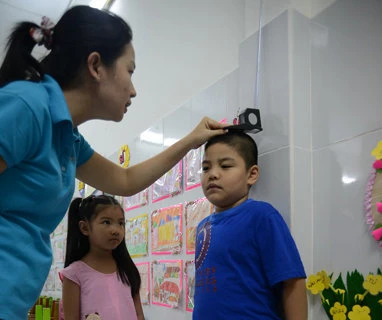Save the Children's School Health and Nutrition Project will now include kindergartens as well as primary and secondary schools in Ho Chi Minh City, Hanoi and Hai Phong, beginning in September.
Vietnam, like many other developing countries, is faced with a range of school health and nutrition issues, Gunnar F. Andersen, Country Director of the Save the Children in Vietnam, said at a recent workshop on the project held in HCM City.
About 70 percent schools have toilets but only 11.7 percent meet the hygiene standards of the Ministry of Education and Training, he said.
Twenty percent of schools have toilets but don't have sufficient water, and most schools don't have soap for hand-washing, he added.
The rate of tooth decay is extremely high, and 85 percent of children have baby tooth decay; 89-99 percent of them are not provided with treatment.
Fifty percent of children don't have sufficient intake of Vitamin A, B1, C, D and iron in their daily diet, and the consumption of iodized salt fell from 100 percent in 2005 to 25 percent in 2009.
Dr Le Van Tuan of the Department of Student Affairs under the Ministry of Education and Training, said that nearly 20 percent-30 percent of students nationwide are short-sighted; 15 percent-30 percent have spinal cord deformation; and 15 percent-40 percent are obese.
The Wrigley-funded School Health and Nutrition Project is not only about water and sanitation and hygiene, Anderson said.
"It also covers skill-based health education and school-based delivery of health and nutrition as well as school and health policies and community support," he said.
Since 2011, the project has gained significant achievements both in terms of increased availability of services for school-based health, hygiene and nutrition and improved quality of the school environment.
Students at 36 project schools had access to health check-ups on height, weight, otolaryngology (ear, nose, and throat), oral health, and vision screening.
Knowledge about sanitation and personal hygiene, vision and hearing care, oral health, nutrition and food safety have been taught to students.
Vo Thanh Tung, the Monitoring, Evaluation, Accountability and Learning Coordinator for Save the Children, said that their health had improved, leading to fewer absent hours due to illness.
Teachers have been trained to conduct health sessions as intra- or extra-curricular activities.-VNA























